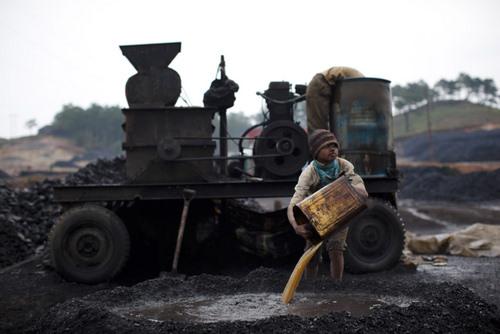Indian activists urge World Bank to cut funding for coal
A boy works at a coal depot on April 16, 2011 near to Lad Rymbai, in the district of Jaintia Hills, India. Local schools in the area, providing free tuition, find it difficult to convince parents of the benefits of education, as children are seen as sources of income. The lure of the mines is stronger than that of the classroom.
Indian activists turned up at the annual meetings of the World Bank and International Monetary Fund in Washington to urge the powerful "aid" outfits to follow through on a proposal to dramatically cut funding for coal-burning power stations, the Asia Times Online reported.
Over the next few days, the delegation will travel from Washington to West Virginia where, in the heart of the Appalachian Mountains, activists from India will meet with local community members in that state who oppose a form of high-impact surface strip mining called mountaintop removal, the web site said.
It's unclear whether moonshine or dueling banjos will be included in the itinerary, but the solidarity trip highlights the increasing confluence of interests of the victims of environmental degradation in the developed and developing world.
According to the Asia Times, the World Bank issued a new draft energy policy earlier this year that would, if approved, dramatically cut funding for coal projects. If the World Bank, which has given billions of dollars in funding to coal development projects in the past, pulls funding for coal, the move could have a ripple effect, the web site said.
Growth in India, much like China, is fueling an "insatiable" demand for energy, said Shikha Bhatnagar, associate director of the South Asia Center at the Atlantic Council, according to Asia Times.
The future doesn't look bright.
Implicitly forecasting a similar fate for many Indian communities to the destruction visited on Appalachia, the Asia Times writes:
Vaishali Patil, a delegation member and activist from the Konkan Coast region of Maharashtra, Gujarat has organized local youth and community groups in her region to oppose new coal development projects. Her organization is called "Ankur", which in Hindi means "seedling".
"There is tremendous unrest," Patil said, referring to the impact of the projects on her community.
The projects in Gujarat, according to a new report "Coal Narratives: Voices from the Front Lines of the Global Struggle", published by the Sierra Club, have been accompanied by a "violent onslaught of land acquisition, displacement, corruption, and intimidation".
Patil said that the biodiversity hotspot where she lives is facing the prospect of many more environmentally high-impact energy projects, including 56 sanctioned iron-ore mining operations, slated for the Western Ghatt Mountains, and 19 proposed coal thermal and nuclear power stations.
Patil said she was looking forward to her trip to West Virginia to meet with US activists.
"I am looking forward to seeing what the civil society advocacy strategies are here," Patil told IPS. "I want to learn from them, to share our struggle for community rights, for the right to natural resources, to save the land and sea – we feel this struggle is for our survival."
The story you just read is accessible and free to all because thousands of listeners and readers contribute to our nonprofit newsroom. We go deep to bring you the human-centered international reporting that you know you can trust. To do this work and to do it well, we rely on the support of our listeners. If you appreciated our coverage this year, if there was a story that made you pause or a song that moved you, would you consider making a gift to sustain our work through 2024 and beyond?
